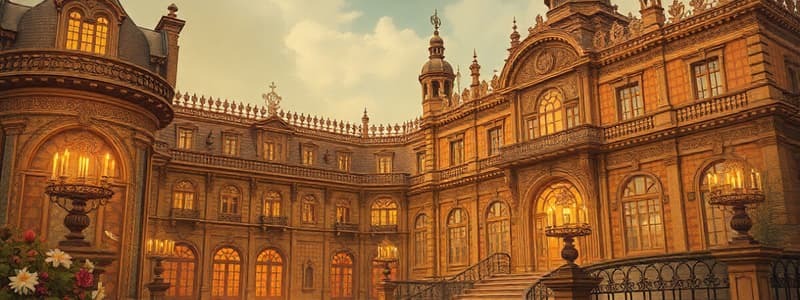Podcast
Questions and Answers
What does the Greek etymology of the word 'poetry' suggest about the function of words?
What does the Greek etymology of the word 'poetry' suggest about the function of words?
- Words lack the ability to evoke emotions.
- Words serve only to describe reality.
- Words have the power to engage and influence. (correct)
- Words are strictly limited to imaginative contexts.
According to the passage, what is one characteristic of literary works?
According to the passage, what is one characteristic of literary works?
- They provide vivid and concrete particulars. (correct)
- They focus primarily on historical events.
- They are limited to fictional narratives.
- They exclusively deal with abstract concepts.
What challenge arises when trying to define literature?
What challenge arises when trying to define literature?
- Literature is tied exclusively to the use of poetic forms.
- The distinction between fact and fiction is often ambiguous. (correct)
- Literature is only comprised of fictional texts.
- Literature lacks emotional resonance.
In the context of literary theory, what does Terry Eagleton suggest about the texts included in English literature?
In the context of literary theory, what does Terry Eagleton suggest about the texts included in English literature?
What aspect of literary experience is highlighted in the content provided?
What aspect of literary experience is highlighted in the content provided?
Which of the following is mentioned as a text that may be included within the scope of literature?
Which of the following is mentioned as a text that may be included within the scope of literature?
How do literary works serve to elevate the reader's experience?
How do literary works serve to elevate the reader's experience?
What is one of the primary distinguishing features of plays compared to novels and prose fiction?
What is one of the primary distinguishing features of plays compared to novels and prose fiction?
What does the distinction between 'historical' and 'artistic' truth challenge?
What does the distinction between 'historical' and 'artistic' truth challenge?
Which term is used to describe any poem about death?
Which term is used to describe any poem about death?
What aspect of poetry is highlighted in its appreciation of language?
What aspect of poetry is highlighted in its appreciation of language?
How does the etymology of the word 'theatre' relate to its function?
How does the etymology of the word 'theatre' relate to its function?
In what way can a single poem be categorized?
In what way can a single poem be categorized?
Which element is essential for a play but not necessarily for poetry or fiction?
Which element is essential for a play but not necessarily for poetry or fiction?
What common characteristic do plays share with poetry and fiction?
What common characteristic do plays share with poetry and fiction?
Which form of literary output is described as an architect's blueprint for a house?
Which form of literary output is described as an architect's blueprint for a house?
What is the central term derived from both religious and legal textual study that is essential to literary criticism?
What is the central term derived from both religious and legal textual study that is essential to literary criticism?
Which factor is NOT mentioned as influencing the methodologies of literary studies?
Which factor is NOT mentioned as influencing the methodologies of literary studies?
What term is used to describe the act of interpreting biblical texts?
What term is used to describe the act of interpreting biblical texts?
How many basic approaches can be isolated within literary interpretation?
How many basic approaches can be isolated within literary interpretation?
Which approach to literary criticism focuses primarily on the context of the text?
Which approach to literary criticism focuses primarily on the context of the text?
What is considered the climax and the end of the English Renaissance in literary history?
What is considered the climax and the end of the English Renaissance in literary history?
Which era is referred to as the Restoration in English literary history?
Which era is referred to as the Restoration in English literary history?
Which genre began to emerge prominently in the eighteenth century as a new literary form?
Which genre began to emerge prominently in the eighteenth century as a new literary form?
Who is considered a significant author of the neoclassical or Augustan age?
Who is considered a significant author of the neoclassical or Augustan age?
What work is considered the first edition marking the beginning of Romanticism?
What work is considered the first edition marking the beginning of Romanticism?
What common characteristic defines much of the literary writing in America during the seventeenth and eighteenth centuries?
What common characteristic defines much of the literary writing in America during the seventeenth and eighteenth centuries?
What important theme does Romanticism emphasize, as noted in early works of the period?
What important theme does Romanticism emphasize, as noted in early works of the period?
What type of texts have garnered increased interest in recent years, particularly focusing on a non-European perspective?
What type of texts have garnered increased interest in recent years, particularly focusing on a non-European perspective?
What does the statement 'some texts are born literary, some achieve literariness' imply about literature?
What does the statement 'some texts are born literary, some achieve literariness' imply about literature?
What is suggested about the essence of literature?
What is suggested about the essence of literature?
How does the content suggest literature is related to societal functions?
How does the content suggest literature is related to societal functions?
Which of the following best describes the term 'non-pragmatic treatment' of language?
Which of the following best describes the term 'non-pragmatic treatment' of language?
What can be inferred about reading different types of texts?
What can be inferred about reading different types of texts?
What is a major challenge in defining literature according to the text?
What is a major challenge in defining literature according to the text?
Which example illustrates a non-pragmatic reading of a text?
Which example illustrates a non-pragmatic reading of a text?
What does the content imply about the societal perception of literature?
What does the content imply about the societal perception of literature?
Flashcards are hidden until you start studying
Study Notes
Literature and Imagination
- Reading literature allows an immersive experience through imagination, senses, feelings, and intellect.
- Literary works such as stories, poems, and plays provide concrete details that move beyond abstraction, making experiences vivid.
- Literary analysis involves communicating these experiences using terminology and methods from literary studies.
Defining Literature
- Literary theory attempts to define what literature is, acknowledging various interpretations.
- Literature may include imaginative writing (fiction) but also encompasses essays, sermons, autobiographies, and historical texts.
- No strict distinction between 'fact' and 'fiction' allows for a broad understanding of what constitutes literature.
Evolving Perception of Literature
- Literary classification can be flexible; pieces of writing can transition between genres as they are re-evaluated over time.
- Texts may be considered literary even if not originally constructed as such; context determines their literary status.
- The concept of 'literariness' may be applied to diverse forms of writing, suggesting literature is defined by reader perception rather than inherent qualities.
Characteristics of Drama
- Plays must be performed to achieve their full artistic potential, contrasting with novels and prose fiction.
- The term 'theatre' relates to viewing and interacting with the performance, emphasizing audience engagement and multisensory experience.
- Despite being a distinct genre, plays share narrative elements like characters, settings, and themes with fiction and poetry.
Literary Genres and Historical Context
- John Milton’s works during the English Renaissance mark a significant period in literary history with political pamphlets and religious epics.
- The Restoration period saw the adaptation of classical literature, with authors like John Dryden and Alexander Pope leading this evolution.
- The rise of the novel as a genre began with authors like Daniel Defoe and Samuel Richardson in the 18th century, shifting literary dominance from epic to novel.
American Literary Development
- Early American literature is characterized as the Puritan or colonial age, deeply rooted in religious motivations.
- Texts from African American slaves offer new perspectives on historical social conditions, reflecting diverse experiences.
- Romanticism emerged as a significant shift in English literature, focusing on nature and emotional experiences, marked by the publication of the Lyrical Ballads.
Influence of Religion and Law on Literary Studies
- Religious and legal discourses share a historical influence on literary studies, particularly in interpretation practices.
- Hermeneutics describes the interpretative process used in both religious and legal texts, informing literary criticism.
- The field of literary studies is marked by various contradictory opinions and methodological approaches, reflecting broader ideologies and sociopolitical contexts.
Methodological Approaches in Literary Theory
- Literary criticism is characterized by a multiplicity of methods and theoretical trends.
- Four basic approaches in literary theory are text-oriented, author-oriented, reader-oriented, and context-oriented, providing frameworks for analysis.
- Each school within literary studies offers unique methodologies shaped by philosophical influences and cultural contexts.
Studying That Suits You
Use AI to generate personalized quizzes and flashcards to suit your learning preferences.




